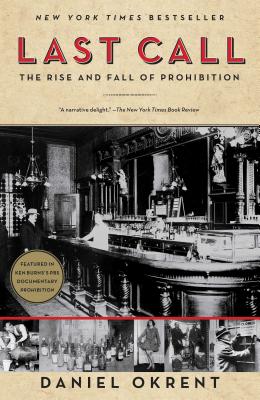My complaint is minor, actually: in a perfect world, a few of the pages about political machinations would have been swapped for more info about the more titillating descriptions of speakeasies, flappers, and social life (these aspects were addressed, just not in the ratio I yearned for). Admittedly, Okrent is not ignorant of this: "The most familiar legacy of Prohibition might be its own mythology, a body of lore and gossip and Hollywood-induced imagery that comes close enough to the truth to be believable but not close enough to be...well, true."
What it is, if not the source for all the gossip and lore surrounding the 14 years Prohibition lasted, is the most thorough and engaging history of the era when America transitioned from rural to urban (and all the changes that entailed) that I've come across. I loved discovering how many different issues were tied into this thing that we label, simply, Prohibition. There's the conflict between rural and urban lifestyles, federal government's role in the individual's life, women's suffrage, the federal budget and income tax, immigration and racism, classism, religion, continuing resentment from the Civil War, - the list goes on and on. This book is the WHY that always seems so out of reach, and the amazing thing is how enjoyable and attainable the author has made it.
If you hold the slightest interest in American history, you won't regret setting aside a little time for this book. Highly researched, well organized, and a joy to read, this is what history should be. You'll meet forgotten famous people like Wayne Wheeler and Mabel Willebrandt; you'll discover the origins of powder rooms, booze cruises, Las Vegas, NASCAR, and tourism in the Bahamas. I could talk about it for days, but instead I'll leave you with a few brief excerpts and a strong encouragement to check it out for yourself.
"The connection between liquor and politics was not a new one. When twenty-four-year-old George Washington first ran for a seat in the Virginia House of Burgesses, he attributed his defeat to his failure to provide enough alcohol to the voters.""The booming prescription trade had been accompanied by a dawning realization among America's physicians that alcoholic beverages were in fact useful in treating twenty-seven separate conditions, including diabetes, cancer, asthma, dyspepsia, snakebite, lactation problems, and old age."
"It was a later edition of the KKK that focused its venomous loathing on black people; this version had a special hatred for Jewish and Catholic immigrants. The Klan, which supported woman suffrage in behalf of Prohibition, in turn supported Prohibition as a weapon against the immigrants. [...] In many towns there was little distinction between membership in the Klan and in an ASL (American Saloon League) affiliated church.""Wrote newspaperman Malcolm Bingay, 'It was absolutely impossible to get a drink in Detroit unless you walked at least ten feet and told the busy bartender what you wanted in a voice loud enough for him to hear you above the uproar.'"
"It was one thing for Pennsylvania legislature--any legislature, really--to give militant drys the laws they wanted, but quite another to provide the funds necessary for their enforcement.""In 1925, when The Great Gatsby was published, the meaning of "drug-stores" was as clear as gin."

This sounds like a quality history. Right up my alley. I like it that you review nonfiction. I love your blog. ;)
ReplyDeleteFor some reason I didn't read much nonfiction last year, so I've been hungry for it this year. Still, I'm always afraid it's going to be dry and it'll be a chore to push through, so it is nice to find one that surprises me. This one really illuminated the whole transition into the modern era in a way that I didn't know was possible. :) (and plus, thanks for the compliment - so kind!)
DeleteProhibition is so interesting! I'll keep a look out for this book :)
ReplyDeleteSomething I didn't mention - because there were too many things to mention - was that surprisingly (for me at least) the sentiment against alcohol was much more international than I'd thought. There were a couple of funny Churchill quotes (Prohibition is "an affront to the whole history of mankind.") and other international dynamics mentioned that I really appreciated. In many ways it brought to light how young our country is. Overall pretty fascinating.
DeleteOoh, adding this to my Goodreads TBR shelf. Thanks!
ReplyDeleteYay! I hope you enjoy it.
DeleteSounds like a wonderful book. This era is so filled with the consequences of moral legislation and greed (accompanied by legislation that allowed a concentration of wealth in the upper one percent) that you’d think we learn not to repeat it.
ReplyDelete